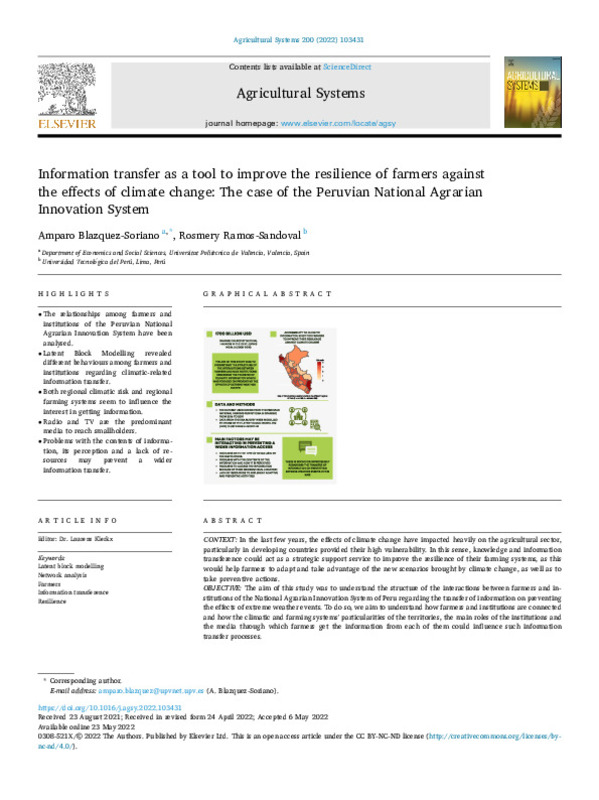JavaScript is disabled for your browser. Some features of this site may not work without it.
Buscar en RiuNet
Listar
Mi cuenta
Estadísticas
Ayuda RiuNet
Admin. UPV
Information transfer as a tool to improve the resilience of farmers against the effects of climate change: The case of the Peruvian National Agrarian Innovation System
Mostrar el registro sencillo del ítem
Ficheros en el ítem
| dc.contributor.author | Blazquez-Soriano, Amparo
|
es_ES |
| dc.contributor.author | Ramos-Sandoval, Rosmery
|
es_ES |
| dc.date.accessioned | 2023-06-06T18:01:54Z | |
| dc.date.available | 2023-06-06T18:01:54Z | |
| dc.date.issued | 2022-06 | es_ES |
| dc.identifier.issn | 0308-521X | es_ES |
| dc.identifier.uri | http://hdl.handle.net/10251/193919 | |
| dc.description.abstract | [EN] CONTEXT: In the last few years, the effects of climate change have impacted heavily on the agricultural sector, particularly in developing countries provided their high vulnerability. In this sense, knowledge and information transference could act as a strategic support service to improve the resilience of their farming systems, as this would help farmers to adapt and take advantage of the new scenarios brought by climate change, as well as to take preventive actions.OBJECTIVE: The aim of this study was to understand the structure of the interactions between farmers and institutions of the National Agrarian Innovation System of Peru regarding the transfer of information on preventing the effects of extreme weather events. To do so, we aim to understand how farmers and institutions are connected and how the climatic and farming systems' particularities of the territories, the main roles of the institutions and the media through which farmers get the information from each of them could influence such information transfer processes.METHODS: The structure of interactions between institutions and farmers is modelled for the period 2016-2019 by means of the Latent Block Modelling clustering algorithm. Given the differences in size, resources and practices between smallholders and large-scale farmers, the relationships between them and the institutions are modelled and analysed separately.RESULTS AND CONCLUSIONS: This study identifies how actors involved in preventive information transfer in the National Agrarian Innovation System of Peru are connected, quantifies their relevance and detects deficiencies in such transfer processes. Results show that less than 13% of smallholders and 18% of large-scale farmers in Peru are getting this information, which is mainly transferred by the TV and the radio (non-specialized media) and mostly only by one governmental institution. Additionally, we detected some groups of farmers who rely on other institutions too, with regional differences in the access to information. Results suggest that there is room for improvement regarding the transfer of information on preventing extreme weather events.SIGNIFICANCE: The results obtained and their discussion could be particularly useful to help in the design of policies focused on improving the efficiency and effectiveness of climatic-related information transfer. In the end, this would help to improve the resilience of Peruvian farmers against climate change and thus, to strengthen the Peruvian agricultural sector. | es_ES |
| dc.description.sponsorship | We would like to thank the two anonymous reviewers, as well as Dr. Vanesse Labeyrie and Dr. Laurens Klerkx for their helpful suggestions that have contributed to greatly improve the manuscript. We are also grateful to Dr. Dionisio Ortiz-Miranda and Dr. Olga M. Moreno-Pérez for their useful advice and ideas. This work has been partially supported by the Spanish Ministry of Science and Innovation under the research project PID2020-117792RA-I00. | es_ES |
| dc.language | Inglés | es_ES |
| dc.publisher | Elsevier | es_ES |
| dc.relation.ispartof | Agricultural Systems | es_ES |
| dc.rights | Reconocimiento - No comercial - Sin obra derivada (by-nc-nd) | es_ES |
| dc.subject | Latent block modelling | es_ES |
| dc.subject | Network analysis | es_ES |
| dc.subject | Farmers | es_ES |
| dc.subject | Information transference | es_ES |
| dc.subject | Resilience | es_ES |
| dc.subject.classification | ECONOMIA APLICADA | es_ES |
| dc.title | Information transfer as a tool to improve the resilience of farmers against the effects of climate change: The case of the Peruvian National Agrarian Innovation System | es_ES |
| dc.type | Artículo | es_ES |
| dc.identifier.doi | 10.1016/j.agsy.2022.103431 | es_ES |
| dc.relation.projectID | info:eu-repo/grantAgreement/AEI/Plan Estatal de Investigación Científica y Técnica y de Innovación 2017-2020/PID2020-117792RA-I00/ES/DINAMICAS DE DECISION NO RACIONALES: LA ECONOMIA DEL COMPORTAMIENTO EN LA INFORMACION FINANCIERA Y NO FINANCIERA/ | es_ES |
| dc.rights.accessRights | Abierto | es_ES |
| dc.contributor.affiliation | Universitat Politècnica de València. Facultad de Administración y Dirección de Empresas - Facultat d'Administració i Direcció d'Empreses | es_ES |
| dc.description.bibliographicCitation | Blazquez-Soriano, A.; Ramos-Sandoval, R. (2022). Information transfer as a tool to improve the resilience of farmers against the effects of climate change: The case of the Peruvian National Agrarian Innovation System. Agricultural Systems. 200. https://doi.org/10.1016/j.agsy.2022.103431 | es_ES |
| dc.description.accrualMethod | S | es_ES |
| dc.relation.publisherversion | https://doi.org/10.1016/j.agsy.2022.103431 | es_ES |
| dc.type.version | info:eu-repo/semantics/publishedVersion | es_ES |
| dc.description.volume | 200 | es_ES |
| dc.relation.pasarela | S\465708 | es_ES |
| dc.contributor.funder | Ministerio de Ciencia e Innovación | es_ES |
| dc.contributor.funder | Universitat Politècnica de València | |
| dc.subject.ods | 02.- Poner fin al hambre, conseguir la seguridad alimentaria y una mejor nutrición, y promover la agricultura sostenible | es_ES |
| dc.subject.ods | 09.- Desarrollar infraestructuras resilientes, promover la industrialización inclusiva y sostenible, y fomentar la innovación | es_ES |
| dc.subject.ods | 15.- Proteger, restaurar y promover la utilización sostenible de los ecosistemas terrestres, gestionar de manera sostenible los bosques, combatir la desertificación y detener y revertir la degradación de la tierra, y frenar la pérdida de diversidad biológica | es_ES |
| dc.subject.ods | 16.- Promover sociedades pacíficas e inclusivas para el desarrollo sostenible, facilitar acceso a la justicia para todos y crear instituciones eficaces, responsables e inclusivas a todos los niveles | es_ES |








